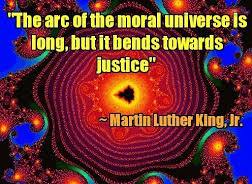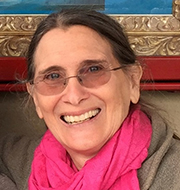 by beCause CEO Nadine Hack – In his 1859 classic, A Tale of Two Cities, Charles Dickens compared life in Paris and London before and during the French Revolution when he wrote “It was the best of times, it was the worst of times.” And if you look at the history of humankind at any time – particularly when we’ve made tectonic global transitions: the Agrarian Age, the Industrial Revolution, and now the Digital Revolution – you also see the best and worst simultaneously.
by beCause CEO Nadine Hack – In his 1859 classic, A Tale of Two Cities, Charles Dickens compared life in Paris and London before and during the French Revolution when he wrote “It was the best of times, it was the worst of times.” And if you look at the history of humankind at any time – particularly when we’ve made tectonic global transitions: the Agrarian Age, the Industrial Revolution, and now the Digital Revolution – you also see the best and worst simultaneously.
There always have been opposing forces: “dark” (e.g.: nationalism, tribalism, fear and hatred of “the other”) vs. “light” (e.g.: empathy, bridge-building, inclusiveness and striving for freedom and human dignity of all human beings). It’s no different now: we live in a time of miraculous technological strides alongside appalling human savagery and unprecedented environmental damage. It can seem our dark side is stronger and overwhelming.
Just look at the plight of Syrian and other refugees. Some European countries offered sanctuary in relatively small or larger numbers. Germany was proactive and compassionate taking in over one million. Yet, other countries not only rejected them, but are considering building walls to ensure they stay out. We witnessed similarly opposing trends in the debate for the American presidency.
Wouldn’t life be grand if every individual, government, business and organisation lived by the classic Golden Rule: “Do unto others as you would have them do unto you”? Wouldn’t it be fabulous if everyone and everything were guided by compassion for everyone and everything else? But isn’t that a ridiculously naive notion, like The Beatles singing All You Need is Love?
Actually, no – providing you think of achieving such a world as an endeavor over time. As a “baby boomer” I started working on behalf of civil, human, and women’s rights when I was quite young. At the time, I thought we were going to do it all right away: I saw it as a sprint and I had to run flat out. Then, as I grew older I began to see it as a marathon: I had to pace myself for the long run. Then, as I grew even older, I realized it was a relay race.
I may not see in my lifetime the fruition of all the social progress I care about but I have a sacred responsibility to do all I can to move it forward and pass the torch to the next generation just as it was passed to me. I can and am playing a meaningful part in the process: the forces of light moving forward as a bulwark against the forces of dark.
As a professional facilitator and a citizen activist, I’ve worked with thousands of people around the world – in business, civil society, communities and governments – to foster cooperative action among adversaries to help them recognize the value of working collectively to resolve issues for their respective and mutual benefit. While cooperation is not synonymous with compassion, it is an integral element of advancing compassion because it requires meaningful, lengthy communication among people who might otherwise never interact.
Much of my belief that humankind can eventually achieve active, effective compassion comes from my “compassion standard-bearer” Dr. Martin Luther King, Jr. I could have written this article just with quotations from his many speeches and books. I offer a few:
- “Change does not roll in on the wheels of inevitability, but comes through continuous struggle.”
- “An individual has not started living until he can rise above the narrow confines of his individualistic concerns to the broader concerns of all humanity.”
- “The ultimate tragedy is not the oppression and cruelty by the bad people but the silence over that by the good people.”
- “Capitalism forgets that life is social. And the kingdom of brotherhood is found neither in the thesis of communism nor the antithesis of capitalism, but in a higher synthesis.”
The first affirms the concept of relay versus sprint in effecting social change; the second asserts the importance of individual effort – one person can make a difference; the third is a sobering reminder that when we’re not working for the light, we’re allowing the dark; and the fourth brings me to Compassionate Capitalism, also known as Conscious Capitalism.
Fostering conscious, compassionate capitalism has been a substantial part of my work in the business arena through my company, beCause Global Consulting. I admire several pioneers, among them:
- Ben Cohen and Jerry Greenfield – who founded the internationally beloved Ben & Jerry’s ice cream in 1978, socially-minded from the start. Jostein Solheim, their CEO, stays true to their principles as he says, “The world needs dramatic change to address the social and environmental challenges we are facing. Values-led businesses can play a critical role in driving that positive change.”
- Gary Hirshberg – who founded the organic yogurt company Stonyfield Farm and was dedicated at the onset to run a socially-minded business concerned with the needs and rights of his workers as well as the health of the public and the environment. His book Stirring it Up: How to Make Money and Save the World shows the value of his business model.
- Marc Benioff and Karen Southwick – he the CEO and Chairman of Salesforce.com, she a noted business journalist, co-authored Compassionate Capitalism: How Corporations Can Make Doing Good an Integral Part of Doing Well. They show that giving back isn’t a matter of size but of sustained commitment.
- Roberta Laing, General Counsel of Whole Foods Markets and trustee of Conscious Capitalism, Inc., a company that promotes and facilitates Conscious Leadership in business and other areas based on having full integration of a higher purpose, compassionate culture, and conscious leadership. The most important element of their creed is the Golden Rule.
- Rich DeVos – co-founder of Amway and author of Compassionate Capitalism: Helping People Help Themselves that specifically details how to be entrepreneurial, successful and compassionate at the same time.
Increasingly, companies worldwide are changing the way they value and manage their key stakeholders, broadening who they include in that spectrum (e.g.: employees, customers, their entire supply chain, even “watchdog” advocates who monitor their practices, etc.), as well as profit for their shareholders, by implementing more inclusive and compassionate policies, practices and environments.
“Triple Bottom Line” the 3P of people, planet, profit has become a mantra, albeit, for many corporations it’s still only that: words. Yet, just the fact that it’s entered the mainstream lexicon means there is growing recognition of the need to measure not just the financial, but also the social and environmental performance of corporations. I believe with the enhanced attention of social media combined with millennials entering the workforce and consumer base, we are approaching a tipping point of 3P becoming more of a guiding force.
I also draw your attention to three civil society organisations, among countless others, working on this:
- Skoll World Forum – a highly respected think-tank devoted to “Bringing together creative and ambitious leaders, thinkers, artists and innovators to inspire and challenge each other in entrepreneurial approaches to global challenges.” Their April 2016 forum in Oxford was themed “Fierce Compassion”. What a wonderful term – like “tough love”!
- Natural Capitalism Solutions – its founder and co-creator of “Natural Capitalism” concept, Hunter Lovins was called a “green business icon” by Newsweek and a millennium “Hero of the Planet” by Time Magazine for her decades framing the sustainability movement, making the business case for energy efficiency, renewable energy, resource productivity and climate protection. I feature her in my TEDx “Adversaries to Allies”.
- Wittenberg Center for Global Ethics – dedicated to projects and publications that promote responsible leadership in business. “Our goal is to sustainably promote peace, justice and prosperity in the emerging world society. Globalization, world economy and competitive markets need to be utilized for the common good and the sustainable benefit of all people.”
A global movement of individuals and groups is working creatively and diligently to foster compassion in every area of human life and endeavor. For example, Dr. James Doty, a widely noted clinical professor of neurosurgery and founding director of Stanford University Medical School’s Center for Compassion and Altruism Research and Education (CCARE).
CCARE’s research on the positive qualities of the human mind including compassion, altruism and empathy, shows that in relation to health and longevity, learning to be “compassionate with intent” has more benefit than being at one’s ideal weight, stopping smoking or routine physical exercise.
Doty says, “Compassion is what defines us as human beings and will define our survival as a species.” That’s why CCARE conducts extensive Compassion Cultivation Training courses and works with a broad spectrum of other groups to conduct socially productive programs.
There are myriad companies, organisations and individuals who have embraced the idea that compassion is the key to peace, freedom, justice, health and well-being in a world that often seems to have gone mad. I can’t name them all; I don’t even know them all. What I do know is that the relay race is well on its way!
Creating a compassionate world begins with believing it’s possible. Step two is learning to have more empathy and be more compassionate with your family, friends, and colleagues. Step three is to promote creating a more caring world through concrete actions. Which “Tale of Two Cities” (“Worlds”) will we tell: the choice is up to you; will you join the relay? Do unto the world as you would do unto yourself and remember it’s a relay race and results take time.
This post by Nadine B Hack, CEO beCause Global Consulting, is the foundation for what will be a chapter in Volume II of Imaginal Cells, Visions for Transformation, a project of Reboot the Future, based on understanding the potential power of the Golden Rule.

